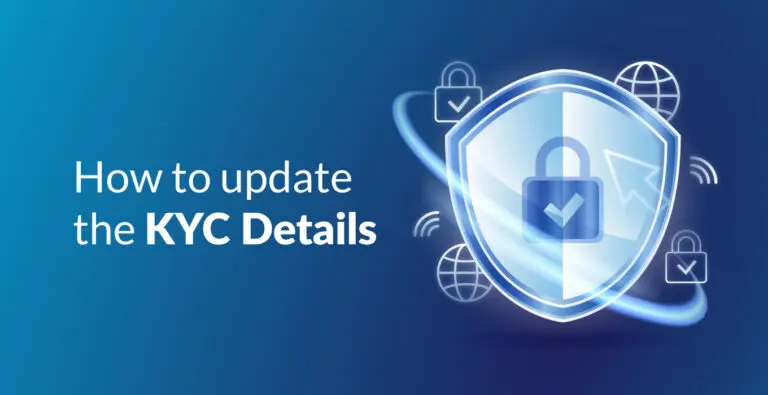
Table of Content
E-KYC or online KYC is an effective way to submit your identity and address proof online. It is a standardized way to check the authenticity of customers on a portal by the Indian government. To verify their identity and address, customers of the financial service are required to submit KYC documentation before investing in a variety of financial instruments like fixed deposits, mutual funds, and more
The primary goal is to potentially catch and eliminate illegal activities on any platform. For most portals — be it mutual funds’ investments, brokerage trading platforms, or bank websites — before you create an account, you will be required to carry out your KYC. The Reserve Bank of India has made it mandatory for everyone using these platforms.
KYC stands for Know Your Customer. It’s one of those super important things banks and financial companies need from us. The RBI, SEBI, and IRDAI have made it mandatory for everyone dealing with money banks, insurance providers, and mutual funds to follow KYC norms.
So why should you care? Because without it, your bank account, your SIPs, or even your demat account could be frozen. That’s why learning how to update KYC online (or offline, if you prefer) is a life skill now.
Updating KYC details online is very rare, and it is not a very common thing to do. However, it’s possible to encounter a situation where you may have changed your name or address. Similar to how KYC is generally considered a one-time process, so is its update. The scenarios when KYC updates may be required are as follows:
If you do not change your address or name for a second time, this process is generally considered a one-time way to access your financial history and carry out transactions. KYC update is mandatory in case you have updated your personal details again.
Let’s break down how to KYC update.
Both work. But if you’re wondering how to update eKYC online from the comfort of your couch? Read on.
Here’s an easy-to-follow plan if you were wondering how to update bank KYC online:
If you ever googled how to update KYC, this is your one-stop answer. No long queues, no awkward forms; just a few clicks.
Now that you have got an answer to the query, ‘how do I update my kyc online?’ here’s what you will need –
| Type of Proof | Examples |
| Identity Proof | PAN card (mandatory) |
| Address Proof | Aadhaar, Passport, Voter ID, or a utility bill |
| Photo | A recent passport-sized one |
Whether you’re uploading or submitting them offline, just make sure they’re valid and match your records.
So you’ve done the work, but how do you know it went through?
Follow this:
| Status | What It Means |
| KYC Verified | You’re good to go! |
| KYC On Hold | Some issue; might need fixing |
| KYC Rejected | Something’s wrong. recheck documents |
Both online and offline KYC verification procedures take around one week to be authenticated. The online KYC registration may take a much shorter time, but this can vary based on a slew of factors, such as whether or not there were any errors, inconsistencies, or ambiguities in the application form. Hence, your updated information, depending on the portal carrying out KYC, may take longer than usual to reflect. However, ensuring the form is correctly filled with all the latest information can expedite this entire process.
‘Know your client’ is basically the procedure of evaluating a customer’s identity. KYC update basically means making a few changes to your KYC documentation, if there are any. For example, if you changed your address, you would need to update it on KYC.
RBI has made it mandatory for folks to update their KYC details frequently in order to maintain much-needed consistency across various industries and safeguard the financial system. To help make the procedure faster, RBI has made it accessible for individuals to update KYC details online.
To verify your KYC details online, visit the official website of a KYC Registration Agency (KRA). Log in using your registered mobile number, enter the OTP received, and upload a self-attested copy of your e-Aadhaar to complete the process.
The documents needed to update KYC typically include a government-issued photo ID (like a passport or driver’s license), proof of address (such as utility bills or bank statements), and possibly income proof (like salary slips or tax returns), depending on the institution’s requirements.
Yes, most banks and other financial organizations allow you to amend your KYC details online. Most of them allow it through their own websites or mobile apps by uploading the required document electronically.
In case your KYC is not updated, you may be restricted from accessing your account or even conducting transactions. Sometimes, your account will be frozen until you update the information to comply with the regulations.
The validity of KYC varies by institution and by jurisdiction, though it would typically remain valid for one to three years. At times, the bank requests periodic updates or re-verifications of your KYC information to maintain compliance in line with the regulatory obligations and to maintain the accuracy of the records.
![]() IIFL Customer Care Number
IIFL Customer Care Number
(Gold/NCD/NBFC/Insurance/NPS)
1860-267-3000 / 7039-050-000
![]() IIFL Capital Services Support WhatsApp Number
IIFL Capital Services Support WhatsApp Number
+91 9892691696
IIFL Capital Services Limited - Stock Broker SEBI Regn. No: INZ000164132, PMS SEBI Regn. No: INP000002213,IA SEBI Regn. No: INA000000623, SEBI RA Regn. No: INH000000248, DP SEBI Reg. No. IN-DP-185-2016, BSE Enlistment Number (RA): 5016
ARN NO : 47791 (AMFI Registered Mutual Fund & Specialized Investment Fund Distributor), PFRDA Reg. No. PoP 20092018

This Certificate Demonstrates That IIFL As An Organization Has Defined And Put In Place Best-Practice Information Security Processes.